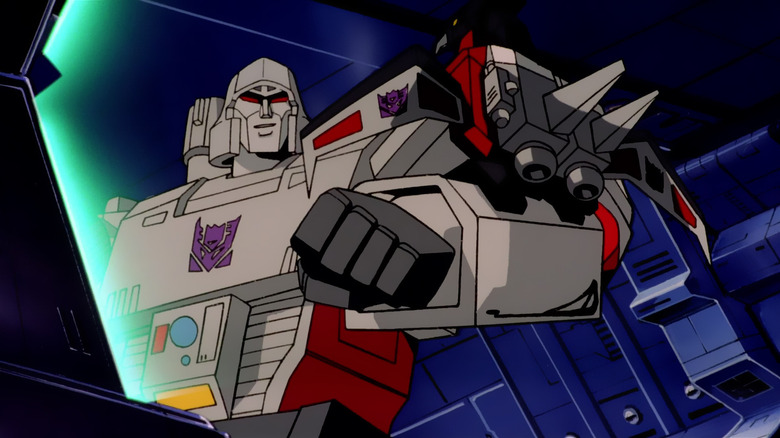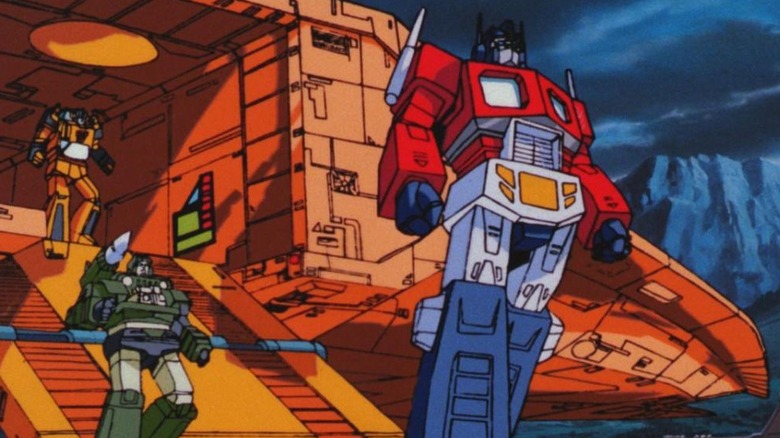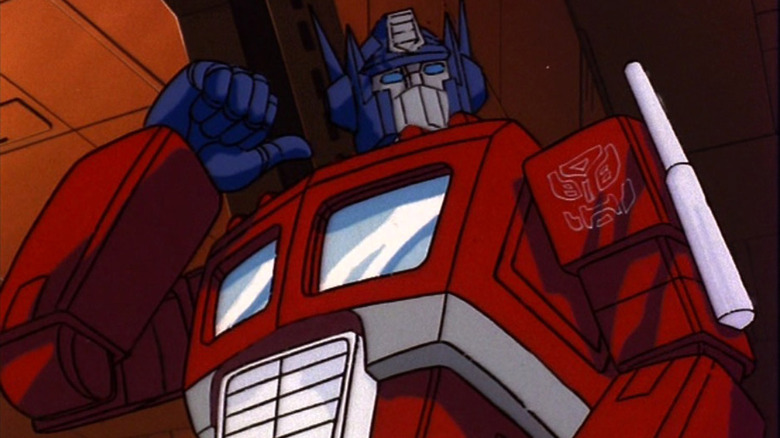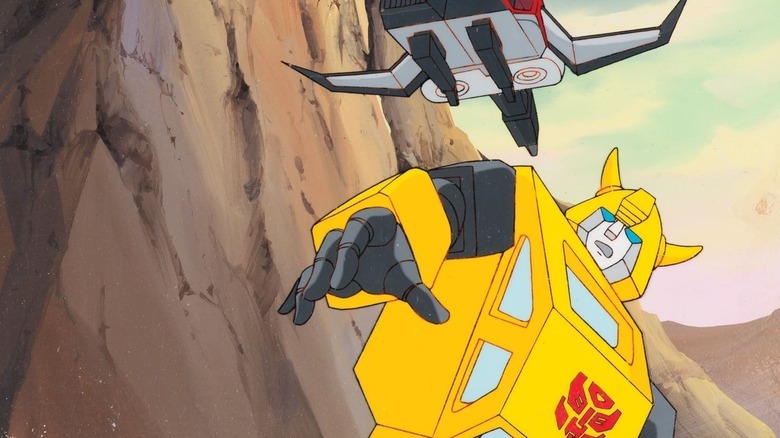Recording Sessions For The Transformers Series Were 'Bedlam' Behind The Scenes
In 1984, a lot of laws about what was and wasn't allowed in children's TV programming began to loosen. Throughout the decade, more and more companies became incredibly brazen about including advertising content directly into their TV shows, transforming many shows into 30-minute commercials for toys. An '80s child would watch a show, knowing they could soon hound their parents to buy them the toy counterparts of their favorite characters. This branding became deeply insidious, and many children of the 1980s grew up with a deep and abiding nostalgia for their favorite toy ads. Artistry, character, writing, storytelling, and mythology were all distant, tertiary concerns during this era, and the bulk of animated shows from the '80s are deeply, deeply terrible as a result.
The Transformers toy line was launched in 1984 after Hasbro repurposed multiple robot molds from a Japanese toy line. The Transformers were robots who could be manipulated and twisted into new forms, most often cars or planes. They were "Robots in Disguise."
The mythology was as simple as they come: after coming to Earth from their distant planet of Cybertron, the Transformers continued their vicious war between a tribe of Autobots (the good guys) and the Decepticons (the bad guys). They occasionally befriended humans, but mostly spent their time firing lasers at one another. Peter Cullen played Optimus Prime, the leader of the Autobots, Frank Welker played Megatron, the leader of the Decepticons, and comedian Chris Latta played the screechy-voiced Starscream, the villain's sidekick. Other notable voice luminaries such as Don Messick, Scatman Crothers, and Casey Kasem also appeared.
Evidently, getting these actors in a recording booth was seen as a free license to fool around. According to the behind-the-scenes interview for 1986's "Transformers: The Movie," the recording was a wacky, chaotic game of actorly one-upmanship.
It was Bedlam
Although conceived as a corporate product, the makers of the "Transformers" TV show cared about their characters, and they cared about their actors. According to story supervisor Flint Dille, "Transformers" was one of the only animated shows of its era to hold table readings of an episode's entire script, with the cast reading all their lines in character. Dille said that slight alterations, improv, and rewrites were permitted. On other shows, actors would often be given just their lines or were perhaps encouraged to focus only on pieces of the script. "Transformers" bothered to think about the script as a whole. Dille said:
"We're gonna get the stuff that's actually in the script, but if you have some idea that you really like, let's hear it. And those guys were really good at it because they really knew their characters, they knew each other, they knew how they related to the other characters, and I think that's why a lot of the Sunbow shows at the time had a feel to them."
Sunbow was the name of the show's American distributor. They also made the toy-inspired cartoons "Jem and the Holograms," "G.I. Joe," "My Little Pony," and "Visionaries: Knights of the Magical Light."
Evidently, allowing actors to do full-length table reads while being encouraged to improvise led to some moments of what might be called "competitive acting." Dan Gilvezan who played the Autobot Bumblebee recalls the voice talent sparring. He said:
"You fill a room with a bunch of personalities like the ones we had on this show, actors and musicians, comedians, I mean it was Bedlam. With Michael Bell trying to top Frank Welker trying to top Peter Cullen, I mean, and everyone was in there doing their own thing, it was just crazy."
Heavy hitters
Bell was a cartoon voice veteran who had appeared in dozens of popular animated shows throughout the 1980s, having played roles on "G.I. Joe," "Voltron: Defender of the Universe," and three of the "Smurfs." Curiously, he provided the speaking lines for Peter Criss in the TV movie "KISS Meets the Phantom of the Park." Welker, a titan in the industry, played Fred on "Scooby-Doo," as well as Dynomutt, Jabberjaw, GoGo DoDo, and just about every animal you've heard in any movie since 1978. If you count all his blockbusters, Welker is the third highest-grossing actor of all time. The deep-voiced Cullen, meanwhile, voiced trailers and commercials, appeared in various Sunbow productions, and would continue playing Optimus Prime through the live-action films in the '00 and '10s. Latta, meanwhile, came from the world of stand-up.
Getting all these actors in a room together was to invite play ... and chaos. Dille recalled:
"Some were just, like, the best of the best real pros. You know, the Frank Welkers and stuff like that of the world. Then you had guys, incredibly raw characters like Chris Latta who's a standup comedian. And that is probably if you had to get the special forces of the entertainment industry it's standup comedians. And he was just a totally different animal. But that's what made it special. I mean, Chris was great, but he was just, you know, a raw force of energy in the room."
The voice was directed by Walter Burr, who also handled most of the Sunbow shows, and Gilvezan recalls a story of how his director had to step in to make peace between the performers who had gotten a little carried away giving each other crap.
The sweat of it all
Gilvezan recalled that Latta really got into character as Starscream, throwing his body around and bumping into his co-stars. He was also, evidently, quite a sweaty man. Gilvezan said:
"Michael Bell was placed next to Chris Latta in one of the recording sessions, and Chris had a tendency to perspire freely. And because of the gyrations and stuff, Michael actually had to order a towel at one point. 'Wally [Burr], could someone bring me a towel? Because I'm soaked on one side from Chris.' So, it was pretty crazy. Those recording sessions were pretty crazy. I do have to hand one thing to Wally: he rode herd on us and he actually got the shows done. So, for that, my hat's off to him."
The "Transformers" show, like most animated shows of the era, was produced on the quick, and modern eyes may see a lot of cut corners making their way onto the screen. And while the ultimate goal of the series was to drum up interest in Hasbro toys, many youngsters still came to love the characters. It may have been the casual line deliveries, and the attention to performance that made "Transformers" take off while other, similar shows did not. One can credit Gilvezan, Welker, Cullen, Latta, Bell, and especially Dille and Burr for their efforts. Without them, it's possible that adults wouldn't still be thinking about — and buying — Transformers toys to this day.
To this day, "Transformers" shows remain on the air. Currently running is "Transformers: EarthSpark," available on Paramount+.



